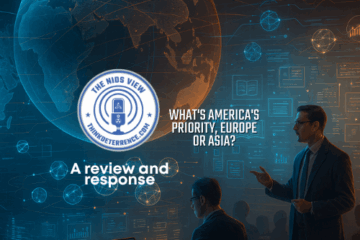This book is not a stale history of an insignificant person. It is a well written, fascinating story centered around a very influential man. It just happens that the man’s name is unknown to most, even if his acts are not. Paul Nitze is a real-life Forrest Gump, albeit a very serious and more reliable narrator of history. America’s Cold Warrior is a book for the casual reader and policy wonk alike. If you enjoy history, war, or great biographies, this book is for you.
Its author, James Wilson, is a supervisory historian at the State Department. Wilson oversees the compilation and editing of declassified documents for publication of the Foreign Relations of the United States. His focus is Cold War national security policy and interactions with the Soviets. He previously wrote a book about the end of the Cold War with a focus on Mikhail Gorbachev. Wilson also writes for War on the Rocks.
His latest effort focuses on Paul Nitze, his life, and his role in American national security policy throughout the Cold War.
Paul Nitze is not a household name when it comes to 20th-century US history or even Cold War history. There are only a handful of books about him; four books were published from 1969 to 2006 mentioning him, usually in passing. Keep in mind, he authored NSC-68, which is arguably the most important national security document in the nation’s history. His relative obscurity is not surprising, though, as his opinion of political scientists was mostly negative.
One can see from James Wilson’s resume that he understands the influential events of history and works with official material on these matters every day, which means Paul Nitze is important beyond just authoring NSC-68. Nitze was not just an advisor, but someone known by all post–World War II presidents, and too important to be promoted to a cabinet-level position.
Paul Nitze was and is important for reasons other than just a historic memo and the Cuban Missile Crisis. This was a man who helped write the Selective Service Act, helped procure resources for the Cold War fight against communism, wrote the final reports of the US Strategic Bombing Survey, and authored the Strategic Arms Reduction Treaty (START). His conclusions on the turning and end points for the Axis Powers during the war informed his beliefs throughout the Cold War.
Some of today’s challenges would be familiar to Nitze. He warned of expanding NATO and was highly critical of the State Department’s lack of imagination and ability to adapt. He understood what was required to win a war and a nation’s vulnerabilities during war. If he were alive today, he would most likely find the US to be as provocatively weak as it was on December 7, 1941.
As a man who believed in peace through strength, he would be discussing the nation’s weak economy and supply-chain challenges and advocate for technological innovation across the Department of Defense. He would also oppose consolidating military and private-sector logistics.
One of his worst fears was that an attack on American military forces would push the president into choosing between a retaliatory nuclear strike or surrender. This is still a concern today.
Wilson offers readers a great read and tells untold stories that those interested in World War II and the Cold War will enjoy. The later chapters set up the major policy decisions and events that bring readers to the present day.
This work reminds us that we have been here before, and that achieving strategic superiority is not easy. It took advocates like Paul Nitze, with grit and determination over decades, to make it happen. The threats to the nation continue to evolve. Thus, a new generation of advocates for technological and strategic superiority are needed. American leaders need to look past credentialism and embrace the competent, from wherever they may come. Hopefully the story of Paul Nitze will be an inspiration to them.
One of the highlights of the book is the tale of the overnight negotiations that took place in Reykjavik, Iceland, on the weekend of October 11–12, 1986, when President Ronald Reagan sought to bring General Secretary Gorbachev around to his previously outlined positions regarding START. After an all-night haggling session, and some shuttle diplomacy with their respective bosses, came the morning after. Paul Nitze and Soviet delegation head, Sergei Akhromeyev, agreed that, under the terms of START, they would count gravity bombs and short-range attack missiles on heavy bombers as one warhead.
Nitze was never constrained by academic tenure or any other hindrances. He thrived as an investment manager in private equity, fund management, and foreign direct investment when not in government. That gave Nitze the financial autonomy that shielded him from employers’ and pressure groups’ retaliation. It provided him with the freedom and ability to perform his political activism at the highest level.
Nitze was a man of action who shaped the clockwork of history’s small and big wheels. That does not mean he despised thinkers who kept their fingers on the pulse of things. But what Nitze really loathed was ineffective theorists with no impact on real decision-making.
James Wilson’s biography of Paul Nitze, who experienced the Cold War’s “tension between opposites,” reminds us of the words of Sir William Francis Butler who wrote, “The nation that will insist on drawing a broad line of demarcation between the fighting man and the thinking man is liable to find it’s fighting done by fools and it’s thinking done by cowards.”
Michael Fincher is a Fellow at the National Institute for Deterrence Studies and a practicing attorney.
Christophe Bosquillon is a Senior Fellow at the National Institute for Deterrence Studies. He has over 30 years of international experience in general management, foreign direct investment, and private equity and fund management across various industries in Europe and the Pacific Basin. Views expressed in this article are the author’s own.
About the Author

Christophe Bosquillon
Christophe Bosquillon is a Senior Fellow at the National Institute for Deterrence Studies. He has over 30 years of international experience in general management, foreign direct investment, and private equity and fund management across various industries in Europe and the Pacific Basin.




